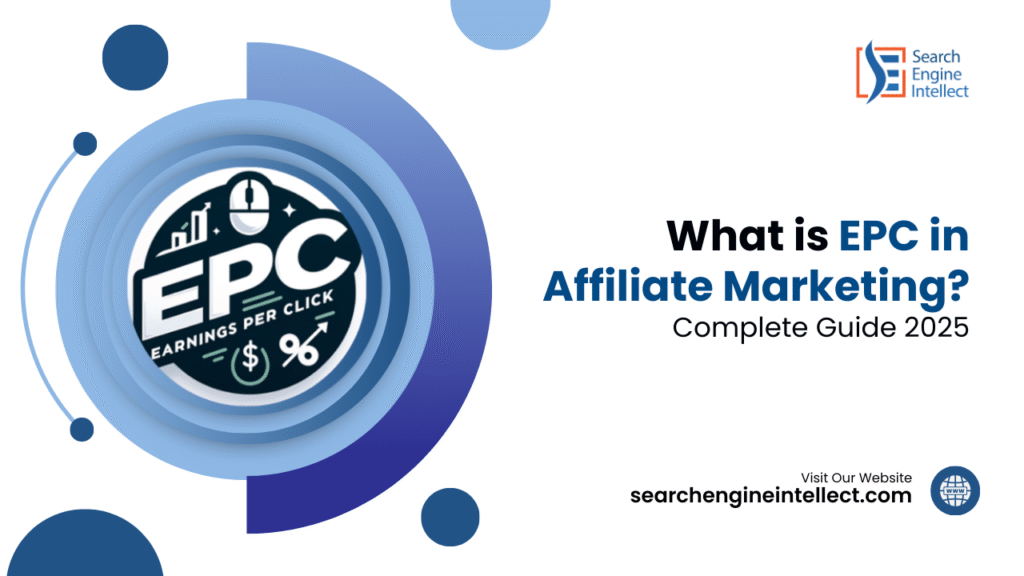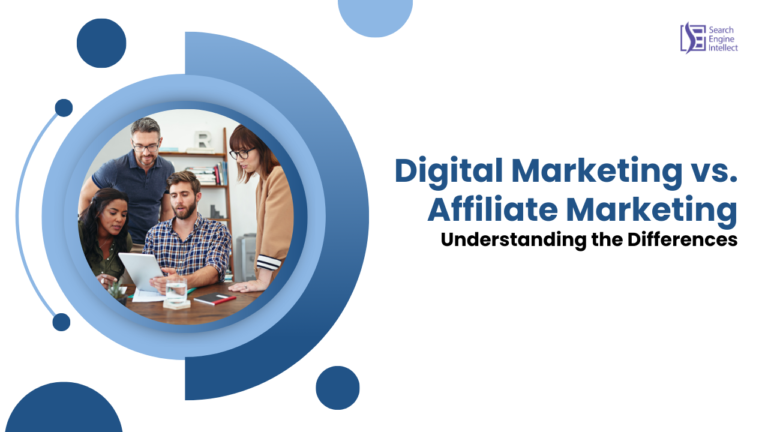Table of Contents
Book a Free Demo Class

What is EPC in Affiliate Marketing? Complete Guide 2025
Earnings Per Click (EPC) is one of the most important numbers in affiliate marketing. It tells you how much money you earn every time someone clicks on your affiliate link.
For affiliates, EPC helps decide which program is worth their time. For advertisers, it shows how well their campaign is converting. A higher EPC means more profit with the same amount of traffic.
Understanding EPC is not just about looking at numbers. It’s about finding what drives better clicks, quality traffic, and higher conversions. Whether you are a beginner or an experienced marketer, knowing your EPC can guide you to make smarter decisions.
Want to improve your EPC? Start by analyzing your traffic sources, testing different offers, and working with trusted affiliate networks.
Explore Affiliate Marketing Services to increase your conversions.
What is Earnings Per Click in Affiliate Marketing
EPC in affiliate marketing stands for Earnings Per Click. It measures the average amount of money an affiliate earns for each click sent to an affiliate offer.
In simple terms, EPC tells you how valuable one click is.
Example: If you earn ₹1,000 from 100 clicks, your EPC is ₹10.
Also read: Affiliate Marketing: What it is and How to Get Started
What Does EPC Stand for in Affiliate Marketing
EPC in affiliate marketing stands for Earnings Per Click.
It is a performance metric that shows how much money an affiliate earns on average for each click they send to an affiliate offer.
In simple terms:
EPC tells you the value of one click.
Example:
- 100 clicks sent
- ₹2,000 earned
EPC = ₹2,000 ÷ 100 = ₹20
This means each click is worth ₹20 on average.
Affiliate marketers use EPC to:
- Compare affiliate programs
- Identify profitable offers
- Decide where to send traffic
A higher EPC usually indicates a better-converting offer, but it should always be evaluated along with conversion rate and traffic quality.
How to Calculate EPC?
EPC, or Earnings Per Click, is one of the most important metrics in affiliate marketing. It tells you how much you earn on average for each click generated through your affiliate links.
Formula: EPC=Total Earnings / Total Clicks
Step-by-Step Calculation Example
Let’s say you earned $250 from 500 clicks on an affiliate campaign. Using the EPC formula:
EPC= 250 / 500=0.50
This means you earn $0.50 per click.
If another campaign earned $700 from 1,000 clicks:
EPC= 700 / 1000 =0.70
So, the second campaign is performing better in terms of EPC.
Factors Affecting Accurate EPC Calculation
- Traffic Quality: Higher-quality, targeted traffic often leads to better EPC.
- Conversion Rates: Even with high clicks, low conversions can lower EPC.
- Offer Type: Some affiliate programs pay more per action, affecting EPC.
- Tracking Accuracy: Incorrect tracking or delayed reporting can skew results.
- Time Period: Seasonal trends and campaign duration impact EPC figures.
EPC Calculation Table Example
| Clicks | Total Earnings | EPC |
|---|---|---|
| 500 | $250 | $0.50 |
| 1,000 | $700 | $0.70 |
Pro Tip: Track EPC over time to identify trends and optimize campaigns for maximum revenue. Higher EPC usually indicates a profitable offer, but always consider it alongside conversion rates and overall ROI.
Why is EPC Important for Affiliates and Advertisers?
EPC (Earnings Per Click) is one of the most valuable metrics in affiliate marketing. It helps both affiliates and advertisers measure performance and make informed decisions.
EPC Important for Affiliates: Evaluating Program Profitability
- EPC shows how much revenue an affiliate earns on average per click.
- High EPC programs indicate better earning potential with the same traffic.
- Affiliates can compare multiple programs and prioritize those with higher EPCs.
- It helps optimize content strategy by focusing on high-performing campaigns.
EPC Important for Advertisers: Measuring ROI and Campaign Quality
- Advertisers use EPC to gauge the effectiveness of their affiliate campaigns.
- A higher EPC suggests that the campaign is converting well and generating more revenue per click.
- It helps advertisers identify top-performing affiliates and reward them for quality traffic.
- EPC data supports better budgeting and marketing decisions.
EPC vs Other Affiliate Metrics
| Metric | What It Measures | Use Case |
|---|---|---|
| EPC | Earnings per click | Evaluating affiliate program profitability |
| CTR (Click-Through Rate) | Percentage of clicks on links | Measuring engagement of content |
| Conversion Rate | Percentage of clicks that convert | Understanding the effectiveness of offers |
| CPA (Cost Per Acquisition) | Cost to acquire a lead or sale | Budgeting and ROI tracking |
Tip: EPC should not be looked at in isolation. Combining it with metrics like CTR and Conversion Rate gives a more complete picture of performance.
Also read: Affiliate Marketing: What it is and How to Get Started
How to Improve EPC in Affiliate Marketing
Earnings Per Click (EPC) is a critical metric for any affiliate marketer. A higher EPC means your clicks are generating more revenue. Here are actionable strategies to improve EPC:
1. Choose High-Converting Affiliate Offers
Not all affiliate programs are created equal. Focus on offers that:
- Have proven conversion rates.
- Offer competitive commissions.
- Align with your audience’s interests.
By promoting high-converting products, each click is more likely to result in a sale, boosting your EPC significantly.
2. Optimize Ad Placements and Content
Placement matters. Experiment with:
- Ads within high-traffic blog posts.
- Product banners in sidebars or at the end of articles.
- Contextual links inside content that naturally encourage clicks.
Better placement increases the likelihood of clicks converting into earnings, which directly improves EPC.
3. Use A/B Testing for Better Conversions
A/B testing helps you understand what resonates with your audience:
- Test different headlines, CTAs, or ad designs.
- Compare ad copy variations for the same offer.
- Track which version drives more clicks and conversions.
Continuous testing allows you to refine your strategy and increase EPC over time.
4. Focus on Niche Targeting for Better Audience Engagement
Targeting a specific niche ensures your audience is highly relevant:
- Promote products that your audience actually wants.
- Build content that solves niche-specific problems.
- Avoid generic offers that appeal to everyone but convert poorly.
Niche targeting improves click quality and conversion rate, which naturally raises EPC.
Check out our detailed guide on SEO AIO GEO AEO SXO Differences to understand how digital optimization strategies can further boost your affiliate performance.
What is a Good EPC in Affiliate Marketing?

The main thing to remember about earnings per click is that it is simply a statistic.
On its own, EPC means nothing; whether it’s $0.10 or $10, EPC is only helpful in relation to how much you spend on traffic sources.
For example, if you have a $1 EPC on a product but a $2 CPC for paid ads, you’re losing money. You can either increase your EPC, decrease your CPC, find another source of traffic, or cancel the campaign and promote a different product.
Profitability is the single most important factor in a successful EPC.
Example Table of Good vs Bad EPC
| Industry | Poor EPC | Average EPC | Good EPC |
|---|---|---|---|
| Health & Wellness | < $0.10 | $0.10 – $0.50 | > $0.50 |
| Technology | < $0.20 | $0.20 – $1 | > $1 |
| Fashion | < $0.15 | $0.15 – $0.60 | > $0.60 |
Common EPC Mistakes to Avoid
While EPC (Earnings Per Click) is a crucial metric, many affiliates make mistakes that can mislead performance analysis. Avoiding these errors can help you make smarter decisions and maximize revenue.
- Misinterpreting Low EPC as Program Failure
Low EPC doesn’t always mean the affiliate program is bad. Sometimes, niche programs have smaller audiences or higher-priced products with fewer clicks. Analyze trends over time before abandoning a program. - Ignoring Seasonal Trends in EPC Performance
EPC can fluctuate depending on seasons, holidays, or promotional events. For example, retail or e-commerce campaigns often see higher EPC during festive seasons. Ignoring these trends may give an inaccurate view of affiliate profitability. - Overlooking Traffic Quality
High traffic does not guarantee high EPC. Low-quality or irrelevant traffic often results in poor conversions. Focus on attracting targeted visitors who are genuinely interested in your affiliate offers. - Additional Tip:
Regularly track EPC alongside other metrics like CTR, conversion rate, and average order value. This holistic approach prevents misinterpretation of isolated EPC numbers.
EPC vs Other Affiliate Metrics: A Quick Comparison
When evaluating affiliate campaigns, EPC is a key metric—but it doesn’t work alone. Understanding how it compares to other metrics helps you make smarter marketing decisions.
EPC vs CPA (Cost Per Acquisition)
- EPC measures how much you earn per click, giving a quick sense of program profitability.
- CPA focuses on the cost for each conversion, helping advertisers understand ROI.
- Key difference: EPC emphasizes affiliate earnings, CPA emphasizes advertiser cost efficiency.
EPC vs CPC (Cost Per Click)
- EPC shows affiliate earnings per click.
- CPC shows the advertiser’s cost per click in paid campaigns.
- CPC is useful when running paid traffic campaigns, while EPC measures actual affiliate revenue per click.
EPC vs CPM (Cost Per Mille)
- CPM tracks cost per 1,000 impressions.
- Unlike EPC, CPM focuses on ad exposure, not revenue per click.
- CPM is helpful for brand awareness campaigns, EPC is better for affiliate program performance.
Quick Comparison Table: EPC vs Other Metrics
| Metric | Focus | When to Use |
|---|---|---|
| EPC | Earnings per Click | Evaluate affiliate profitability |
| CPA | Cost/Revenue per Acquisition | Optimize conversion-focused campaigns |
| CPC | Cost per Click | Manage paid advertising efficiency |
| CPM | Cost per 1,000 Impressions | Measure reach and brand visibility |
This comparison helps affiliates and advertisers understand which metric aligns with their campaign goals.
“Ready to boost your earnings? Start analyzing your current campaigns’ EPC today and implement strategies that will elevate your affiliate marketing success! “
EPC Is Not An Affiliate Commission.
The terms “EPC” and “affiliate commission” should not be used synonymously. It is a formula that calculates the total value of your click-throughs.
While it is most commonly linked with CPC or PPC (Pay-Per-Click) affiliate schemes, in which affiliates are paid only when a visitor clicks on an affiliate link posted on their website, you can calculate the value of your clicks using any affiliate payment model, not only PPC or CPC.
EPC is a formula that may be used to calculate the average value of all clicks rather than just one.
It allows you to study data from several clicks and determine your total earnings for 100 clicks.
It’s more than just a payout structure for CPC affiliate programs; it’s also a useful analytics tool for affiliate marketers, providing insights into their affiliate operations.
Of course, not every visitor who clicks on an affiliate link on your website will make a purchase, sign up for a webinar, or complete an email capture form. The vast majority of clicks would result in no sign-ups or income.
Furthermore, different sorts of sales or signups can result in different amounts of affiliate commissions, but calculating the average income per click will help you plan your campaign.
In other words, EPC provides a comprehensive overview of your marketing and promotion efforts
Also read: What is Google Analytics and How Does It Work?
Highest EPC Affiliate Programs
Some of the highest-paying affiliate programs include:
These platforms often provide affiliates with valuable data regarding their average EPC, helping them make informed decisions about promotions.
Conclusion
While EPC (Earnings Per Click) is a key indicator of affiliate performance, it shouldn’t be the only metric you rely on. High EPC can signal profitable campaigns, but it doesn’t reflect other crucial factors like traffic quality, conversion rates, or long-term customer value.
A holistic affiliate strategy combines EPC with metrics such as CPA (Cost Per Acquisition), CTR (Click-Through Rate), and overall ROI. This approach ensures you optimize both revenue and sustainability.



